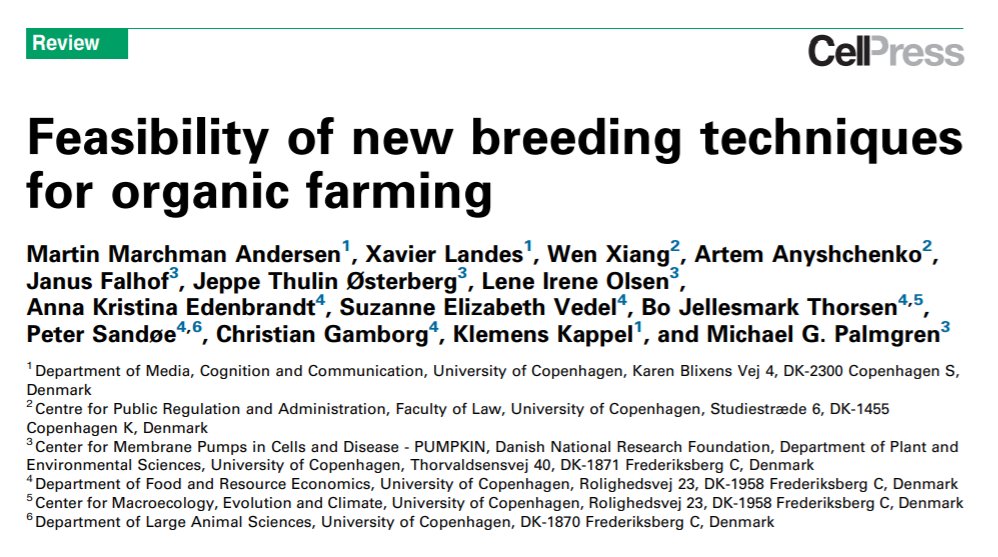1/ To end the week, we’re going a bit off-piste by reviewing a paper that looks at rewilding in organic farming by using biotechnology to introduce genes of wild relatives into crop plants to boost productivity as well as support nature. But its controversial #rewildingscience 

2/ The paper explains that organic farming aims to work ‘with nature’ by mimicking processes in natural ecosystems for the provision of nutrients and pest control, instead of relying on chemical inputs, compared with conventional farming. However it is less productive
3/ Certain forms of biotechnology are considered irreconcilable with organic agriculture, such as genetic engineering’ However, the papers proposes that as technologies evolve, it is not obvious that all forms of technology should be deemed incompatible with organic farming
4) The review continues by highlighting that wild relatives have many beneficial traits over modern crop plants, due to evolutionary pressure and the loss of gene function during the domestication process
5) Approximately 95% of the crop plants used in organic farming were bred for conventional agriculture approaches, which limits their suitability for organic farming techniques, where pesticide, herbicide, and fertilizer usage is absent
6) They argue that more robust plants, by bringing back lost properties aka rewilding, has the potential to increase genetic diversity and reintroduce wild traits that would benefit organic farming and close the yield gap 

7) The paper then looks at different approaches, suggesting that NBTs such as cisgenesis and precision breeding hold excellent promise for rewilding as they offer precise alternatives to introgression breeding that are much faster 

8) They then highlight that advisory bodies have concluded that crops resulting from precision breeding cannot be distinguished from conventionally bred crops, however these crop plants are nonetheless classified as genetically modified (GM) plants
9) The paper then poses the question that given organic farming would benefit from crops that are hardened by rewilding, and the approach to rewilding is feasible from a technological perspective, are rewilded plants bred using NBTs compatible with organic farming principles?
10) The review then moves on to look at the demographics of organic farming, stating that despite consumers viewing the organic production process favorably the total organic market share remains small. Conversely, consumers disfavour GM-breeding technology
11) Organic consumers see perceived health benefits and higher safety, as motivators for purchasing organic food, with it also being seen albeit to a lesser extent, as being more nutritious and tastier.
12) Interestingly, positive environmental impacts are often cited by consumers as a reason to purchase organic foods, however, this is primarily true for committed organic consumers rather than occasional consumers
13) Similar to organic food, the consumers’ willingness to pay for nonGM over GM food is largely explained by health and environmental concerns. The papers also states that, consumers are less averse to GMs when the transferred genes originate from a plant rather than an animal
14/ The paper then points to studies that have found that organic farmers reject the use of GM crops and that both organic and conventional farmers’ resistance to GM crops is aligned with consumers’ views
15) Thus, organic farmers are unlikely to view rewilded crops as being compatible with their production practices and philosophy, even if these crops have enhanced performance
16/ The paper then lists four main objections (i) risks to human health and the environment (ii) so-called ‘socioethical objections’ (iii) incompatibility with the ideas of sustainable agriculture
17/ (iv) the dynamic complexity of the ecosystem as a whole that may lead to unpredictability and unintended effects
18/ The term naturalness is then critiqued, used as it is to sell many farmed goods, but the paper suggest that a lack of a shared understanding of the term ‘naturalness’, and its role have contributed to the stalemate in the debate about using technologies
19/ GM products are not considered Natural, the authors agrue rewilding through precision breeding as a biological argument that doesn't hold and concern is based on historical and interferance basis rather than biological merit.
20/ The paper concludes by saying there is growing recognition among breeders and farmers that valuable natural traits have been lost in both conventional and organic crop.
21/ Also stating that it would seem that successfully rewilded organisms are no more unpredictable or risky than their ancestors.
22/ Finally the authors state that in debates concerning agriculture, it is often asserted that ‘sustainability’, ‘naturalness’, and ‘integrity’ express concerns that are inherently incompatible with NBTs or rewilding.
23/ However, it is far from clear why this should be so, although it should be acknowledged that it might be so for some groups, depending on their interpretations
24/ There was a temptation to leave this paper out of our review as we are focusing primarily on the ecological and social definitions of rewilding. However, having read the paper i decided to include it as there are some crossovers
25/ Firstly, the debate around what is meant by naturalness is one very familiar when thnking about ecological rewilding and also arguments around how we find functional 'wilder' crops for organic systems than current domesticated options
26/ The GM argument is an interesting one and not as black and white as some make it seem. I felt the paper was certainly written in a supportive way but would still reccomend it to everyone for a read. cell.com/action/showPdf…
#rewilding #rewildingscience
#rewilding #rewildingscience
27/27 It was certainly interesting to delve into different meanings of rewilding and some of the information a good learning experience for me
• • •
Missing some Tweet in this thread? You can try to
force a refresh









